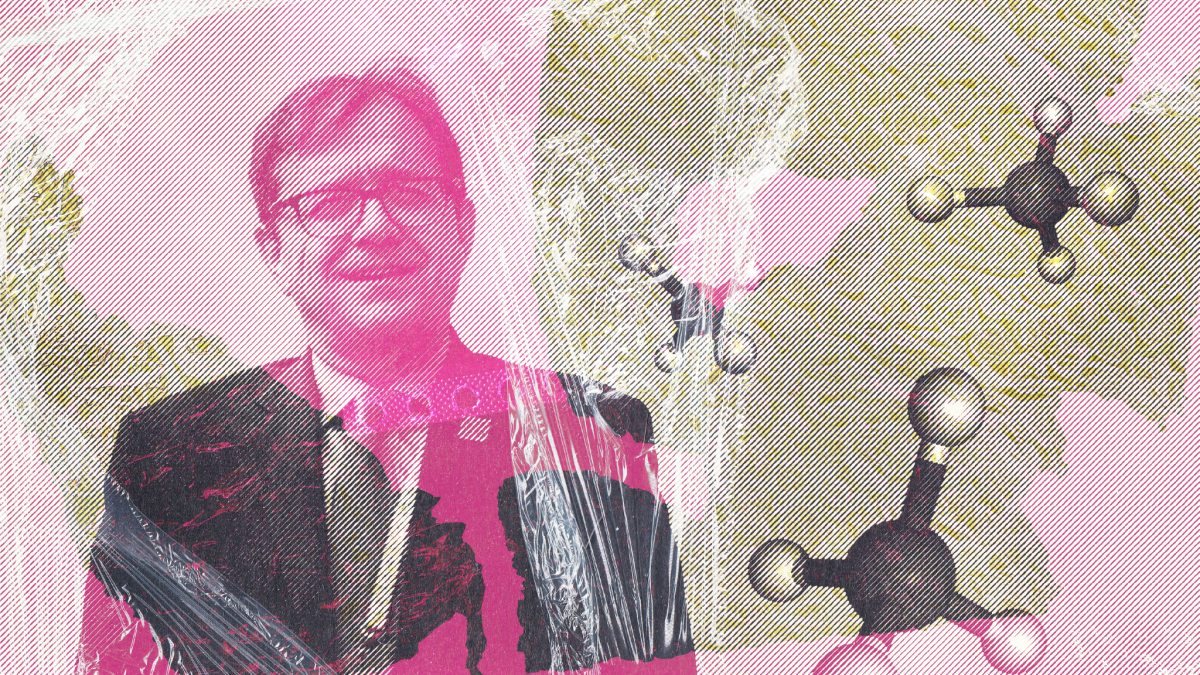Support strong Canadian climate journalism for 2025
Natural Resources Canada tapped a fossil fuel lobby group to help provide recommendations on expanding the nascent hydrogen sector, documents obtained by Canada’s National Observer reveal.
The Canadian Gas Association (CGA) is a fossil fuel lobby group that is under investigation by Canada’s Competition Bureau for alleged greenwashing, and whose membership includes gas giants like Enbridge, FortisBC, TC Energy and others. The CGA served as “industry co-chair” of NRCan’s natural gas working group under Canada’s hydrogen strategy, as co-chair of the “infrastructure working group,” and sat on NRCan’s strategic steering committee, overseeing the entire hydrogen strategy development.
“To say it’s putting the fox in charge of the henhouse would be too kind,” said Keith Stewart, senior strategist for Greenpeace Canada in an interview with Canada’s National Observer. “You shouldn't be having fossil fuel interests steering a process that's supposed to be getting us off of fossil fuels.
“Spoiler: they're not going to come up with great advice.”
While in this position of influence, the fossil fuel industry's priorities were secured, including favourable tax credits worth billions of dollars and ensuring a role for natural gas derived hydrogen in the country’s energy transition.
To grow the hydrogen sector, which Natural Resources Canada estimated could be worth between $1.9 trillion globally by 2050, the federal government has introduced an investment tax credit for “clean” hydrogen expected to cost $5.7 billion over the next five years; a carbon capture, utilization and storage tax credit also worth $5.7 billion over five years; and a $1.5 billion Clean Fuels Fund that, as of October, has provided hydrogen projects with over $300 million.
In other words, a tremendous sum of capital is being made available to grow the hydrogen sector in a bid to help companies capture this growing market. The funding is not tied to a specific industry, but the fact it does not rule out fossil fuel derived hydrogen is an issue for environmentalists and climate scientists.
To supporters of the hydrogen industry, hydrogen can be used in industrial purposes like cement or steel manufacturing, can be blended into natural gas pipelines to steadily decrease emissions, and could be used in vehicles. But to critics, the hydrogen hype is overblown given the intense greenhouse gas emissions associated with its production when using natural gas, and is yet another delay tactic by the fossil fuel industry to slow the transition toward electric vehicles, high efficiency heat pumps, and fully decarbonized heavy industries.
For that reason, environmentalists are concerned that a federal hydrogen strategy that allows for the continued role of fossil fuels misses the mark, and is evidence of the fossil fuel industry hijacking the country’s hydrogen ambitions.
Stewart said that oil and gas companies are attempting to protect their market share by producing hydrogen from natural gas and keeping the Canadian economy using fossil fuels instead of electricity.
“They're basically trying to keep us on the technological pathway we're on, where fossil fuels are the dominant energy source, rather than replacing it,” he said.
Within the natural gas working group are “task teams” that produced four reports for the federal government. The reports looked at the benefits and challenges of natural-gas-produced hydrogen; future demand; technical feasibility of blending hydrogen into gas pipelines; and an emissions intensity threshold for certifying natural gas home appliances.
Natural Resources Canada did not make the reports available before publication time.
In emails obtained through a federal access to information request, Natural Resources Canada policy analyst John Lau asked Suncor’s director of government relations Daniel Goodwin, and hydrogen lead Carlos Giraldo, if they would like to participate or lead one of the task teams.
Lau also noted in his email to Suncor that other fossil fuel giants including oilsands major Canadian Natural Resources, pipeline giant TC Energy, and Arc Resources (which is heavily invested in the Montney gas play in northern British Columbia), are all participating.
“These industry-led Task Teams will help provide data and advice to the Government of Canada in support of the implementation of Canada’s Hydrogen Strategy,” he wrote. “Industry participation will help ensure that our planning for Canada’s future hydrogen economy occurs in a collaborative manner, which reflects industry views and realities.”
One notable industry view comes from the Pathways Alliance, which represents Canadian oilsands majors Suncor, Cenovus, Imperial Oil, MEG Energy, Canadian Natural Resources and ConocoPhillips. Like the CGA, the alliance is also under investigation for alleged greenwashing, and both see a role for fossil fuel companies in Canada’s hydrogen economy.
In a January 2023 letter sent to Finance Canada, which Canada’s National Observer received through a federal access to information request, the Pathways Alliance urged Ottawa to design a clean hydrogen investment tax credit that would leave the door open to hydrogen made with natural gas, by claiming it should “avoid disadvantaging any specific production pathway.”
In the same letter, Pathways Alliance president Kendall Dilling also called on the federal government to let solvent technology used to increase oilsands production be considered “clean” to allow member companies to claim clean technology tax credits, and allow the various tax credits to stack with other provincial and federal funding.
Taken together, it’s evidence Canada’s oil and gas industry is looking to hydrogen as a way to continue using fossil fuels, and it wants taxpayers to help them capitalize on this emerging market.
The CGA, Suncor and Pathways Alliance did not return requests for comment.
The natural gas working group is one of 16 working groups launched under the strategy. But out of nine strategic reports provided to Ottawa to date, four have come from it, suggesting increasing natural-gas-derived hydrogen is a major priority for policy makers. As previously reported by Canada’s National Observer, meeting notes obtained through an access to information request revealed federal policymakers were interested in figuring out how “to persuade financial institutions to invest in blue hydrogen.”
That’s deeply concerning to experts, who say there is significant risk to the climate by building up a hydrogen economy using fossil fuels, even if equipped with carbon capture technology.
Because hydrogen can be produced in many ways, sometimes a rainbow-like codification is used. When hydrogen is produced using renewable energy it’s called green. When produced using nuclear energy it's called pink. When made with natural gas it’s grey, but if made with natural gas and carbon capture technology, it’s called blue. More recently, the hydrogen industry and policy makers have largely dropped the colours and now say the focus is on producing “low-carbon hydrogen.”
A 2021 briefing note about Canada’s hydrogen strategy, prepared for Energy and Natural Resources Minister Jonathan Wilkinson, notes the working groups are developing a clean hydrogen “standard” to formally define the carbon intensity of hydrogen so it can be considered clean. This is a deliberate decision to “move past the use of colours,” according to the briefing note, and develop a common definition to help investors tap into global hydrogen markets. It also helps to distinguish between hydrogen of the same “colour” produced in Canada versus the U.S., one government analyst pointed out in a letter to Canada’s National Observer, because of the differences in electricity generation on both sides of the border.
One reason for the brand change, suggests Robert Horwath, a Cornell University professor of ecology and environmental biology, who in recent years has turned his research attention to hydrogen and has advised Canada’s Senate on the topic, is because evidence suggests blue hydrogen isn’t environmentally friendly.
“Blue hydrogen is a creation of the fossil fuel industry,” he said in an interview with Canada’s National Observer. “It's clearly the gas industry's view of how to keep natural gas going indefinitely into the future in a carbon neutral world.”
In 2021, Horwarth and Mark Jacobson, a Stanford professor of civil and environmental engineering, published the first peer-reviewed study of blue hydrogen’s greenhouse gas emissions and uncovered a startling fact. Far from being clean, blue hydrogen has a greenhouse gas footprint more than 20 per cent higher than burning natural gas.
After that research was published the industry’s messaging switched, he said. “They no longer talked about blue hydrogen, and it's all about carbon intensity and low intensity,” he said.
To grow Canada’s hydrogen sector, the federal government launched a hydrogen strategy in 2020 (and published a progress report in April) that details a number of measures Ottawa is taking. Other than the tax credits and clean fuels fund, other steps include:
- The Strategic Innovation Fund - Net Zero Accelerator that has provided over $300 million for two hydrogen projects
- The $15-billion Canada Growth Fund, which has a strategic objective to help deploy low-carbon hydrogen
- The Canada Infrastructure Bank which has committed $777 million to hydrogen infrastructure
Funding for hydrogen projects is also possible through regional development agencies like PacifiCan, PrairiesCan, FedDev Ontario and the Atlantic Canada Opportunities Agency.
Natural Resources Canada said it designed the hydrogen tax credits “to only provide support to low-carbon hydrogen production projects.”
“The levels of support will vary from 15 per cent to 40 per cent of eligible project costs, depending on the life cycle emissions of the hydrogen produced,” Natural Resources Canada said. “The tier thresholds for the [clean hydrogen investment tax credit] are clearly defined, with the highest supports for the cleanest projects, and ensuring no support for GHG intensive production projects.”
– With files from Jimmy Thomson






Comments
It's not really a "fox in the henhouse" when it was a fox house in the first place. Most of the hype about hydrogen came from fossil fuel interests in the first place, just like carbon capture, and just like small modular reactors and other "nuclear renaissance" talk.
There are potential roles for hydrogen, but they mostly shouldn't involve pipelines and they certainly should have nothing to do with natural gas. I used to think there would be a significant role for hydrogen in industry, but with these new ultra-hot brick things I think the need for hydrogen will be smaller there. It could be a form of storage, like batteries, for when a solar farm is generating more than needed. Batteries are getting so cheap though, so hard to say if the economics will favour hydrogen. It might have a role in shipping. But, like, generating hydrogen from electricity isn't some kind of centralized capital-intensive thing as far as I can make out. So you'd have your hydrogen-making thing and tanks full of hydrogen at the port so you don't have to lose a bunch in leaky pipes.
Hydrogen is worse than pointless for home heating and land transportation, the only applications where I can see it making sense to send the stuff around in pipes, and the only applications where there's any rationale for gas companies to get a look in. Electric cars and trucks and trains, electric heat pumps are much better.
Hydrogen produced from Fossil Gas is worse than Fossil Gas. I used to think Hydrogen would be "the answer" to our energy needs (read Rifkin's book The Hydrogen Economy when it first came out) but the engineering of green hydrogen just doesn't make sense. You need electricity to make "green" hydrogen, then it needs to be converted back to electricity again to use it as an energy source in most applications. It is better to just use the electricity, and use batteries (in all forms) to store excess amounts than to use hydrogen.
Let's keep our eyes on the ball! We have to get OFF of fossil fuels ASAP.
The feds are still putting their eggs into the fossil basket. It wasn't too long ago that NFLD was entertaining green H made with wind power and exporting it to Germany and other EU countries by ship in the form of ammonia. Currently, several EU industries use natural gas in their industrial processes, and H is the best alternative fuel, with some alterations to equipment.
Thanks to Russia's fascism, bullying of its own export customers, warmongering in Eastern Europe and stupidity, Europe is quickly turning away from the Putin regime they depended so heavily on for energy.
Germany recently joined Australia, California and China in suddenly replacing gas-fired power at peak demand times with solar and wind. Rooftop solar in Germany just hit a threshold where battery storage expansion knocked several gas peaker plants offline during the evening peak.
But this doesn't extend to industries that need a combustible gas to make things, like glass. Enter green H.
Both major federal parties are keen on protecting or expanding Canadian fossil fuels, depending which one you're looking at. But their efforts will fail. The evidence documented by independent analysts with the IEA, Bloomberg, S&P Gobal and others have illuminated the unprecedented rise of renewables and the fact they are eroding fossil fuel demand globally, faster each year. Their rate of growth is phenomenal. All federal parties need to do more thorough research because such massive expenditures of public money and tax credits are being distributed for naught, essentially creating stranded assets in advance.
The petro industry will start heading into a worldwide slide by 2030 no matter what petro governments do to shore it up. So says some of the most credible sources who have done the honest math.
Encouraging news about Germany, Australia, California and China despite the wildly variable range of governance involved, not to mention the very different economies.
I think it proves that the proof really IS in the pudding and that ironically the usual bastion of the right wing, the basic neutrality of the market, is the ultimate "third party" in all this, and so is what will most effectively turn the tide.
But I must again take issue with your statement that, "BOTH major federal parties are KEEN on protecting or expanding fossil fuels, depending on which one you're looking at." That is simply not true. Obviously you mean the Liberals are keen on "protecting" fossil fuels because they're still ENGAGING with big oil, which IS relatively bigger in our particular economy after all, not to mention (again) the political reality of significant provincial conservative recalcitrance/obstructionism.
Such obdurate bothsidesism is not only the highly problematic stance of the media, but is also the standard political "third party" take, in this case the NDP who are sucking and blowing just as much as everyone else by still trying to WIN at the federal level WHILE they work with the Liberals to actually get what they're supposed to want most via the mutually signed supply and confidence agreement! Total hypocrisy there and little mention of climate change either.
But increasingly the persistently tribal and narcissistic NDP are becoming part of the problem here, especially when you read about the "long ballot" activist/idealist group in that Toronto by-election who were STILL trying to punish the uppity Liberals by taking THIS opportunity to make a point about FPTP, the EXISTING SYSTEM, like it or no, a.k.a. the harness within we must still ALL work at this point in time, splitting the vote yet again, as is their wont. So like I said, increasingly part of the problem.
Well, in the last week we learned of another paper transfer of 19+ billion bucks in the form of yet another loan guarantee heading to TMX account managers courtesy the federal Liberals.
All capital and loan-backed available taxpayer cash devoted to TMX now exceeds 40 billion. Add in CCS and LNG subsidies and guarantees so willingly provided by the Libs since 2015, surely we're on the way to 100 billion dollars.
Will we ever see that kinda money backstop Trudeau's rhetoric on climate action? Not even close, I'm afraid.
I'm with you on the various Liberal social policies, knowing it could be better if the NDP underpinning was stronger. And that is probably going to be the pivot point for me in the next election where our riding could go in one of three ways. Conservatives remain entrenched on the barbaric side of the equation.
But on the political intentions so far regarding fighting climate change and building an electron economy, just follow the money and prepare for disappointment.
Just a quick correction for accuracy: The turn away from Russia's natural gas has a lot to do with their invasion of Ukraine, a lot to do with persistent US leaning on the EU to blackball them even before that was on the horizon, and nothing really to do with Russia being a bad vendor in any conventional way. It so happens that it may be good for the planet that Russia did get blackballed, because the increased cost to the EU of natural gas has probably pushed them to move faster towards renewable energy. But let's not call it what it isn't.
Russia wanted to do long term contracts to supply natural gas at consistent and fairly low prices; it's as if Alberta had OFFERED the National Energy Program back in the day. Even before the war, the EU had been shifting towards a stupid-California style deregulated energy market which had pushed prices up considerably--much higher than the prices Russia was willing to sell at. Russia wanted to increase their supply of this cheap gas via the Nordstream 2 pipeline, which they had spent a bunch of time, effort and money building, only for the US to finally succeed at the last minute in making Germany nix it in favour of paying twice as much for American LNG and making German chemical industries uncompetitive. It was my opinion at the time that this was probably the final element in Putin's decision to attack Ukraine, in that he realized that if the strongest, potentially most independent EU member was willing to hurt their economy badly to stay onside with the American "Russia-is-the-enemy" narrative, there was definitively no point any longer in diplomacy with the EU.
So basically, it was not Russia's shortcomings as a supplier (or its fascism; Hungary and Turkey are more fascist than Russia and nobody in the EU seems to care, and nobody boycotts Saudi Arabia no matter what horrible putrid things they do) that led to the EU not buying its natural gas. It was mainly sordid geopolitics, mostly emanating from NATO, which is to say the US. But it does mean there's less natural gas being used; I guess a win is a win.
Why bother with hydrogen made from fossil methane? might as well just burn the methane. Also Carbon capture and storage is carbon dioxide capture and storage. That means it "stores" twice as much oxygen as carbon.